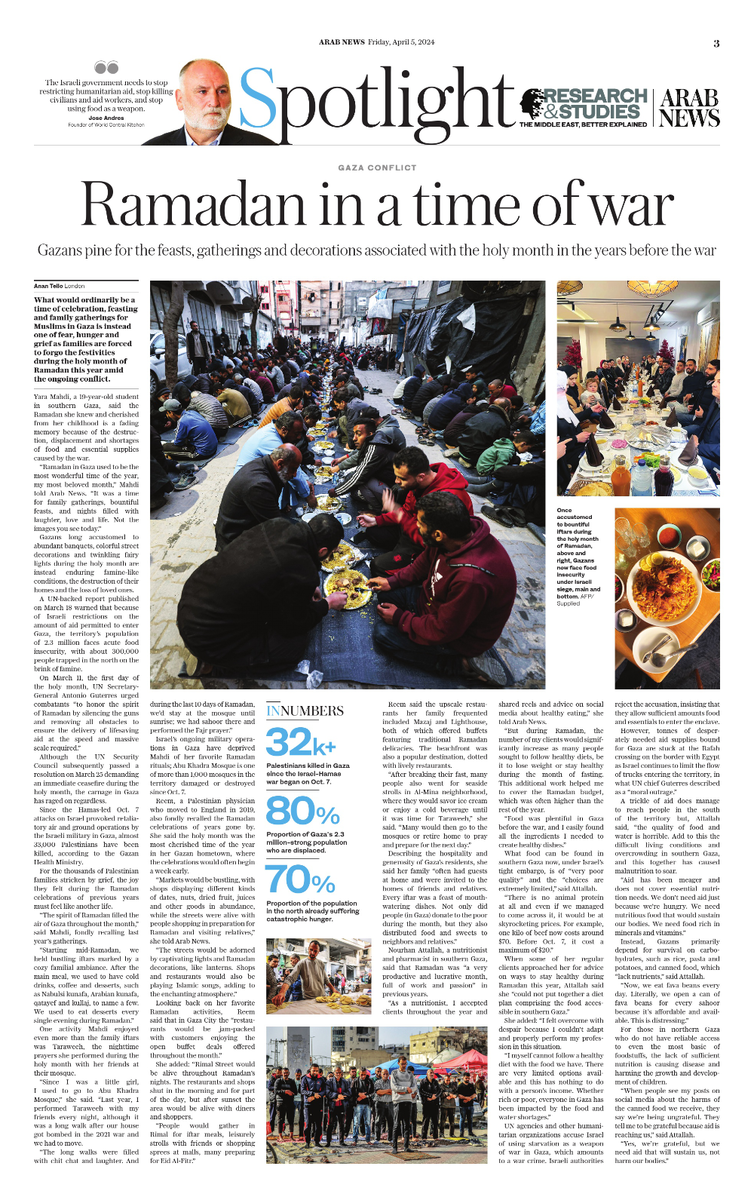LONDON: What would ordinarily be a time of celebration, feasting and family gatherings for Muslims in Gaza is instead one of fear, hunger and grief as families are forced to forgo the festivities during the holy month of Ramadan this year amid the ongoing conflict.
Yara Mahdi, a 19-year-old student in southern Gaza, said the Ramadan she knew and cherished from her childhood is a fading memory because of the destruction, displacement and shortages of food and essential supplies caused by the war.
“Ramadan in Gaza used to be the most wonderful time of the year, my most beloved month,” Mahdi told Arab News. “It was a time for family gatherings, bountiful feasts, and nights filled with laughter, love and life. Not the images you see today.”
Gazans long accustomed to abundant banquets, colorful street decorations and twinkling fairy lights during the holy month are instead enduring famine-like conditions, the destruction of their homes and the loss of loved ones.
A UN-backed report published on March 18 warned that because of Israeli restrictions on the amount of aid permitted to enter Gaza, the territory’s population of 2.3 million faces acute food insecurity, with about 300,000 people trapped in the north on the brink of famine.
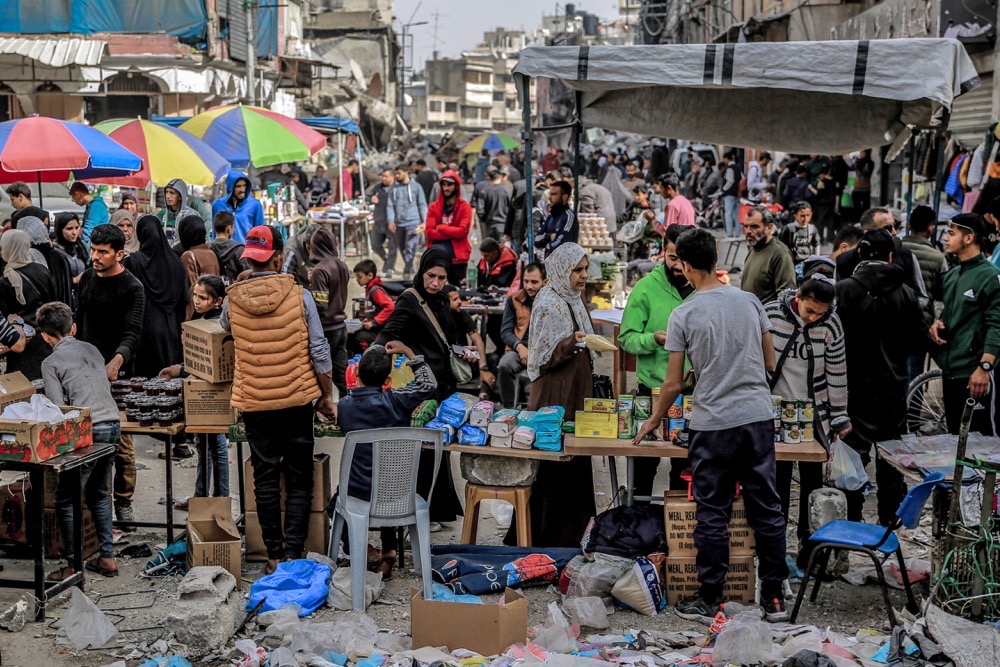
People shop from vendors in an open-air market amidst destruction in Gaza City. (AFP)
On March 11, the first day of the holy month, UN Secretary-General Antonio Guterres urged combatants “to honor the spirit of Ramadan by silencing the guns and removing all obstacles to ensure the delivery of lifesaving aid at the speed and massive scale required.”
Although the UN Security Council subsequently passed a resolution on March 25 demanding an immediate ceasefire during the holy month, the carnage in Gaza has raged on regardless.
Since the Hamas-led Oct. 7 attacks on Israel provoked retaliatory air and ground operations by the Israeli military in Gaza, almost 33,000 Palestinians have been killed, according to the Gazan health ministry.
For the thousands of Palestinian families stricken by grief, the joy they felt during the Ramadan celebrations of previous years must feel like another life.
“The spirit of Ramadan filled the air of Gaza throughout the month,” said Mahdi, fondly recalling last year’s gatherings.
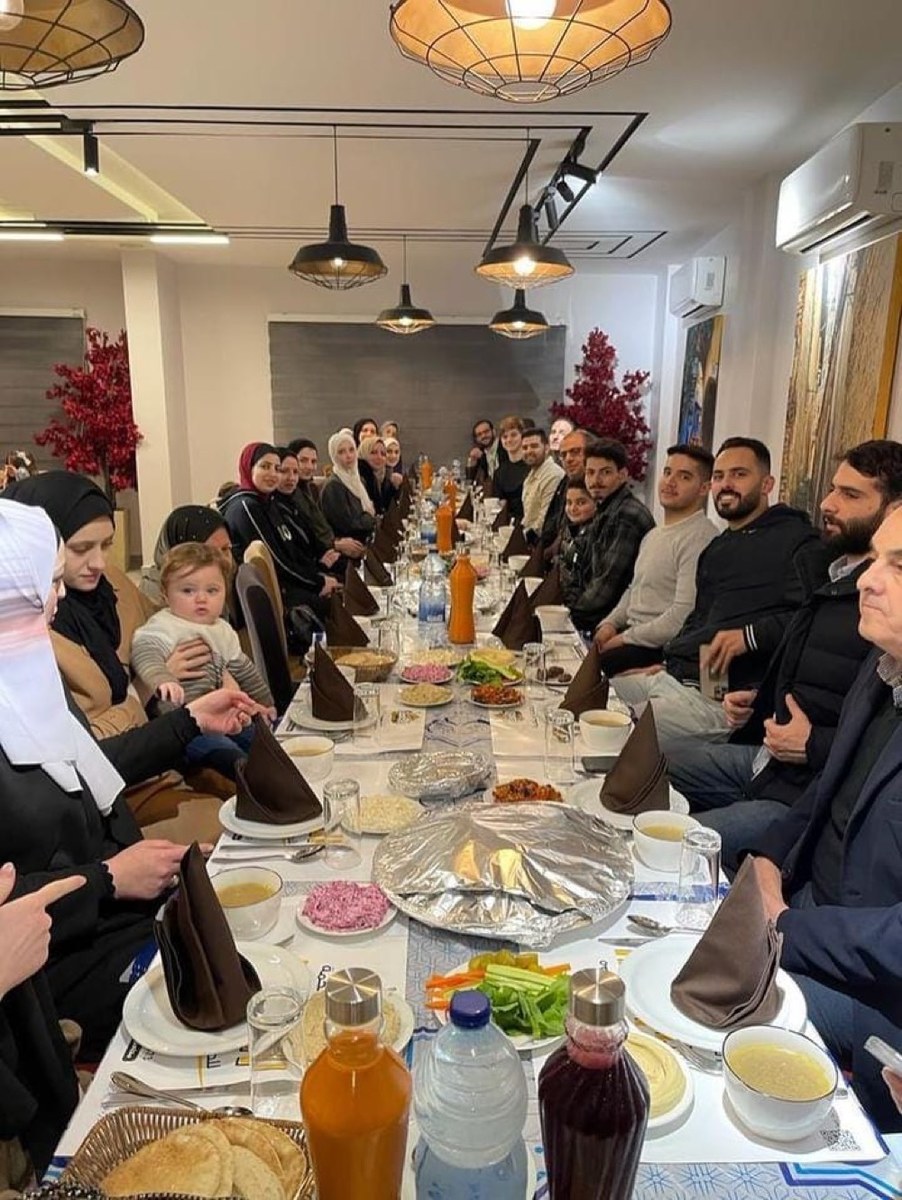
Yara’s extended family gathered for a Ramadan iftar last year. (Supplied)
“Starting mid-Ramadan, we held bustling iftars marked by a cozy familial ambiance. After the main meal, we used to have cold drinks, coffee and desserts, such as Nabulsi kunafa, Arabian kunafa, qatayef and kullaj, to name a few. We used to eat desserts every single evening during Ramadan.”
One activity Mahdi enjoyed even more than the family iftars was Taraweeh, the nighttime prayers she performed during the holy month with her friends at their mosque.
“Since I was a little girl, I used to go to Abu Khadra Mosque,” she said. “Last year, I performed Taraweeh with my friends every night, although it was a long walk after our house got bombed in the 2021 war and we had to move.
“The long walks were filled with chit chat and laughter. And during the last 10 days of Ramadan, we’d stay at the mosque until sunrise; we had sahoor there and performed the Fajr prayer.”
Israel’s ongoing military operations in Gaza have deprived Mahdi of her favorite Ramadan rituals; Abu Khadra Mosque is one of more than 1,000 mosques in the territory damaged or destroyed since Oct. 7.
Reem, a Palestinian physician who moved to England in 2019, also fondly recalled the Ramadan celebrations of years gone by. She said the holy month was the most cherished time of the year in her Gazan hometown, where the celebrations would often begin a week early.
“Markets would be bustling, with shops displaying different kinds of dates, nuts, dried fruit, juices and other goods in abundance, while the streets were alive with people shopping in preparation for Ramadan and visiting relatives,” she told Arab News.
“The streets would be adorned by captivating lights and Ramadan decorations, like lanterns. Shops and restaurants would also be playing Islamic songs, adding to the enchanting atmosphere.”
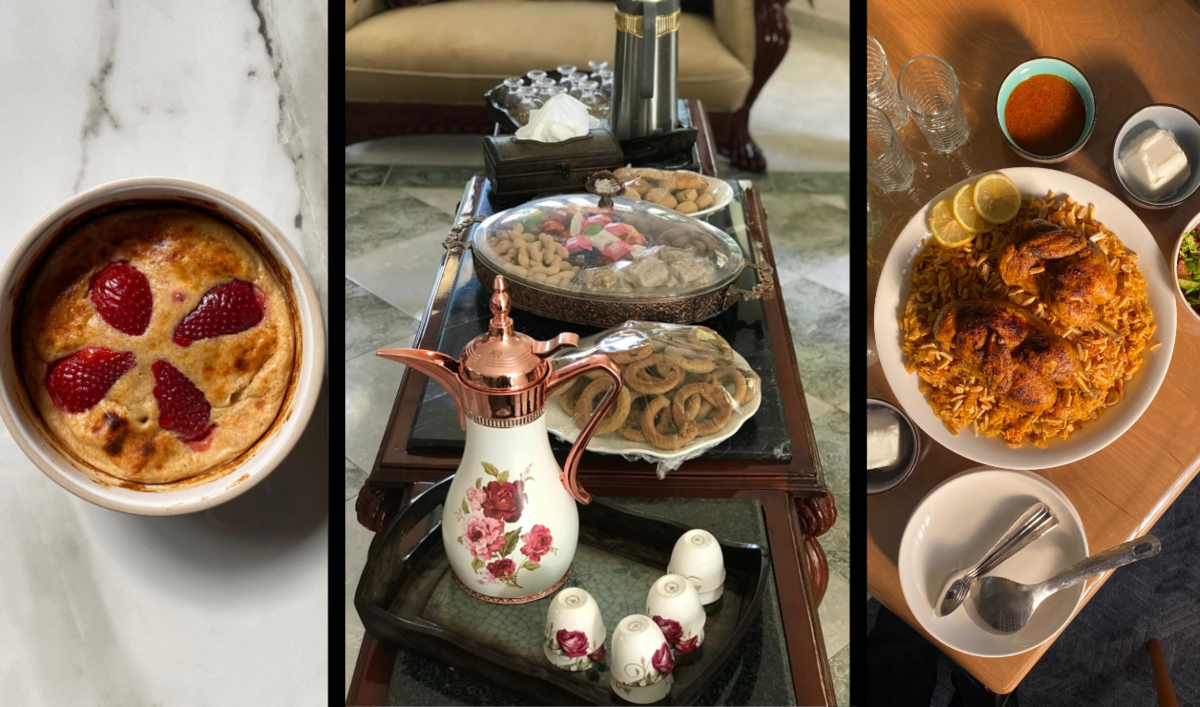
Gazans long accustomed to abundant banquets are enduring famine-like conditions this Ramadan. (Supplied)
Looking back on her favorite Ramadan activities, Reem said that in Gaza City the “restaurants would be jam-packed with customers enjoying the open buffet deals offered throughout the month.”
She added: “Rimal Street would be alive throughout Ramadan’s nights. The restaurants and shops shut in the morning and for part of the day, but after sunset the area would be alive with diners and shoppers.
“People would gather in Rimal for iftar meals, leisurely strolls with friends or shopping sprees at malls, many preparing for Eid Al-Fitr.”
Reem said the upscale restaurants her family frequented included Mazaj and Lighthouse, both of which offered buffets featuring traditional Ramadan delicacies. The beachfront was also a popular destination, dotted with lively restaurants.
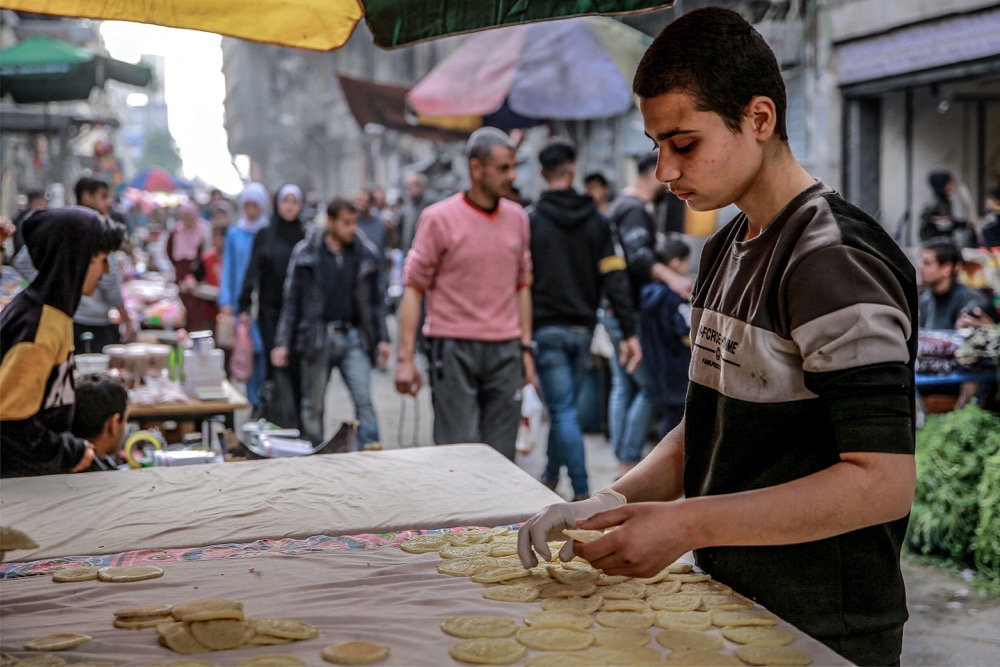
A street vendor prepares raw qatayef, folded pancakes or dumplings, in Gaza City. (AFP)
“After breaking their fast, many people also went for seaside strolls in Al-Mina neighborhood, where they would savor ice cream or enjoy a cold beverage until it was time for Taraweeh,” she said. “Many would then go to the mosques or retire home to pray and prepare for the next day.”
Describing the hospitality and generosity of Gaza’s residents, she said her family “often had guests at home and were invited to the homes of friends and relatives. Every iftar was a feast of mouth-watering dishes. Not only did people (in Gaza) donate to the poor during the month, but they also distributed food and sweets to neighbors and relatives.”
Nourhan Attallah, a nutritionist and pharmacist in southern Gaza, said that Ramadan was “a very productive and lucrative month, full of work and passion” in previous years.
“As a nutritionist, I accepted clients throughout the year and shared reels and advice on social media about healthy eating,” she told Arab News.
“But during Ramadan, the number of my clients would significantly increase as many people sought to follow healthy diets, be it to lose weight or stay healthy during the month of fasting. This additional work helped me to cover the Ramadan budget, which was often higher than the rest of the year.
“Food was plentiful in Gaza before the war, and I easily found all the ingredients I needed to create healthy dishes.”
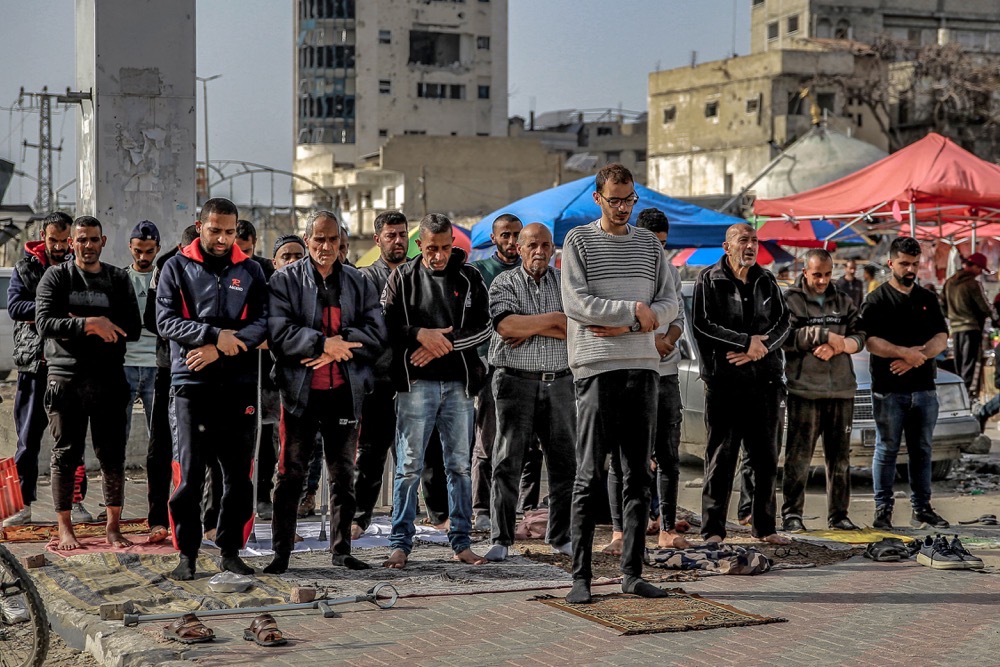
Many places of worship have been destroyed by Israeli bombardment, impacting how Palestinians perform their Ramadan rituals. (AFP)
What food can be found in southern Gaza now, under Israel’s tight embargo, is of “very poor quality” and the “choices are extremely limited,” said Attallah.
“There is no animal protein at all and even if we managed to come across it, it would be at skyrocketing prices. For example, one kilo of beef now costs around $70. Before Oct. 7, it cost a maximum of $20.”
When some of her regular clients approached her for advice on ways to stay healthy during Ramadan this year, Attallah said she “could not put together a diet plan comprising the food accessible in southern Gaza.”
She added: “I felt overcome with despair because I couldn’t adapt and properly perform my profession in this situation.
“I myself cannot follow a healthy diet with the food we have. There are very limited options available and this has nothing to do with a person’s income. Whether rich or poor, everyone in Gaza has been impacted by the food and water shortages.”
INNUMBERS
• 32k+ Palestinians killed in Gaza since the Israel-Hamas war began on Oct. 7.
• 80% Proportion of Gaza’s 2.3 million-strong population who are displaced.
• 70% Proportion of the population in the north already suffering catastrophic hunger.
UN agencies and other humanitarian organizations accuse Israel of using starvation as a weapon of war in Gaza, which amounts to a war crime. Israeli authorities reject the accusation, insisting that they allow sufficient amounts food and essentials to enter the enclave.
However, tonnes of desperately needed aid supplies bound for Gaza are stuck at the Rafah crossing on the border with Egypt as Israel continues to limit the flow of trucks entering the territory, in what UN chief Guterres described as a “moral outrage.”
A trickle of aid does manage to reach people in the south of the territory but, Attallah said, “the quality of food and water is horrible. Add to this the difficult living conditions and overcrowding in southern Gaza, and this together has caused malnutrition to soar.
“Aid has been meager and does not cover essential nutrition needs. We don’t need aid just because we’re hungry. We need nutritious food that would sustain our bodies. We need food rich in minerals and vitamins.”

Gazans long accustomed to abundant banquets are enduring famine-like conditions this Ramadan. (Supplied)
Instead, Gazans primarily depend for survival on carbohydrates, such as rice, pasta and potatoes, and canned food, which “lack nutrients,” said Attallah.
“Now, we eat fava beans every day. Literally, we open a can of fava beans for every sahoor because it’s affordable and available. This is distressing.”
For those in northern Gaza who do not have reliable access to even the most basic of foodstuffs, the lack of sufficient nutrition is causing disease and harming the growth and development of children.
“When people see my posts on social media about the harms of the canned food we receive, they say we’re being ungrateful. They tell me to be grateful because aid is reaching us,” said Attallah.
“Yes, we’re grateful, but we need aid that will sustain us, not harm our bodies.”
